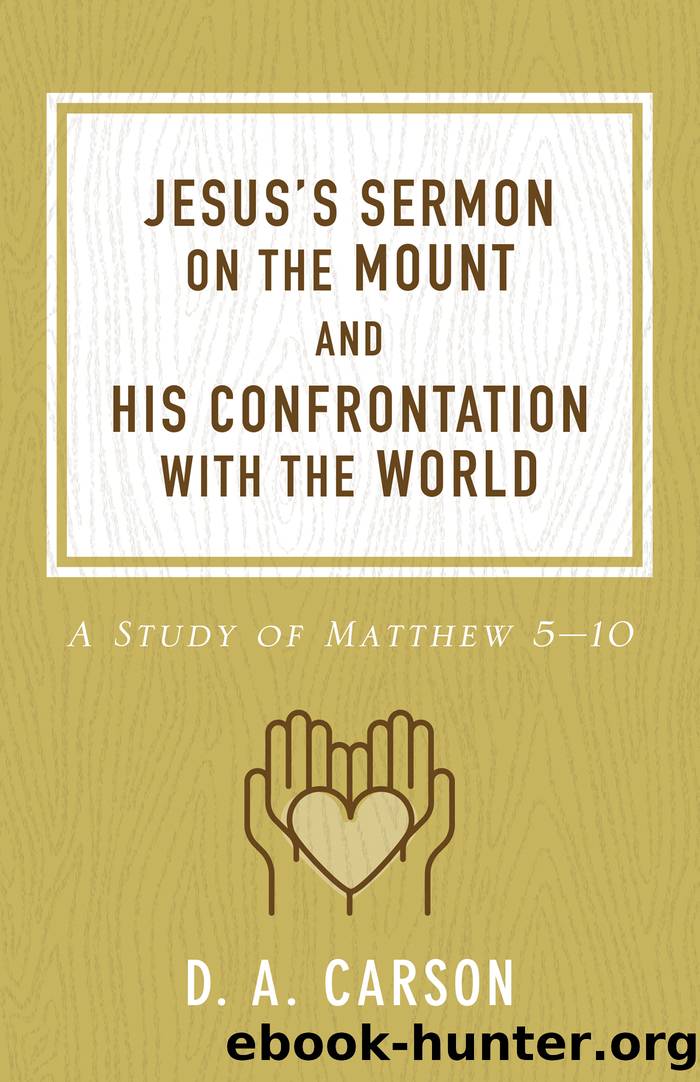Jesus's Sermon on the Mount and His Confrontation with the World by D. A. Carson

Author:D. A. Carson
Language: eng
Format: epub
Tags: Biblical Studies;REL006220;REL012120;REL006710
ISBN: 9781493415328
Publisher: Baker Publishing Group
Published: 2018-09-03T00:00:00+00:00
The Authority of Jesus
From the first seventeen verses of Matthew 8, we learn five things about the authority of Jesus.
1. The authority of Jesus to heal and transform is implicit in his person and mission (8:1–3). In a general way, this point is best drawn from the array of Jesus’s miracles scattered throughout the Gospels. The prophet Isaiah had foreseen a time when the wolf would live with the lamb, when the leopard would lie down with the goat, when the calf and the lion and the yearling would live happily together, and a little child would lead them; when an infant could play safely near a cobra’s hole or put his hand into a viper’s nest; when no one would harm or destroy others, and when the earth would be full of the knowledge of the Lord as the waters cover the sea (Isa. 11). The Messiah would be sent to preach good news to the poor, to bind up the brokenhearted, to proclaim freedom for the captives and release for the prisoners, to proclaim the year of the Lord’s favor, to comfort those who mourn, to bestow on those who grieve a crown of beauty instead of ashes, the oil of gladness instead of mourning, and a garment of praise instead of a spirit of despair—as well as to declare the day of vengeance of our God (Isa. 61). The Old Testament Scriptures preserve many such prophecies, and the miracles of Jesus bring at least some of these prophecies to fulfillment.
When John the Baptist entertains doubts about who Jesus is, Jesus himself replies in words deeply reminiscent of Isaiah 61: “Go back and report to John what you hear and see: The blind receive sight, the lame walk, those who have leprosy are cured, the deaf hear, the dead are raised, and the good news is preached to the poor. Blessed is the man who does not fall away on account of me” (Matt. 11:4–6). In other words, Jesus’s ministry of power, displayed in his miracles, constituted evidence of his identity as the promised Messiah. Perhaps the Baptist entertained doubts because while he lay languishing in prison he longed to see a little more of “the day of vengeance of our God”; but whether or not that was the factor that drove him to doubt, the focus of Jesus’s response to him is plain enough: the miracles that Jesus performs attest who he is and the mission he was sent to accomplish.
But this general point, which can be deduced from the record of Jesus’s miracles as a whole, is greatly stressed in the miracle of healing the leper (8:1–3). The point is made three ways.
First, the disease itself (whether it was what modern medicine calls leprosy [Hansen’s disease] or some other skin ailment) was greatly abhorred and feared by the Jews; and its cure was considered a singular mark of God’s intervention. Those who contracted the disease were forced to live apart, isolated from human touch and the joys of intimate human contact.
Download
This site does not store any files on its server. We only index and link to content provided by other sites. Please contact the content providers to delete copyright contents if any and email us, we'll remove relevant links or contents immediately.
What Is the Gospel? (Foreword by D. A. Carson) by Greg Gilbert(990)
Jesus in Me by Anne Graham Lotz(974)
Daily Strength: Devotions for Bible Believing Study by Douglas Stauffer & Andrew Ray & Rick Quatro(900)
Christian Ethics by Wilkens Steve;(860)
The Practice Is the Path by Tias Little(824)
New Morning Mercies by Tripp Paul David(811)
Cleaning Up Your Mental Mess by Dr. Caroline Leaf(741)
Veritas: A Harvard Professor, a Con Man and the Gospel of Jesus's Wife by Ariel Sabar(735)
Greatest Mystery in the World by Og Mandino(668)
The Creative Call by Janice Elsheimer(607)
No More Christian Nice Guy by Paul Coughlin(590)
Our Appointment with Life by Thich Nhat Hanh(576)
Monastic Archaeology by Unknown(569)
2084 by John C. Lennox(560)
This One Wild and Precious Life by Sarah Wilson(546)
Jesus--Awesome Power, Awesome Love (Discover 4 Yourself® Inductive Bible Studies for Kids) by Kay Arthur(535)
The Catholic Verses: 95 Bible Passages That Confound Protestants by Dave Armstrong(531)
The Duties of Parents by J.C. Ryle(519)
The Tale of the Tardy Oxcart (Swindoll Leadership Library) by Swindoll Charles R(507)
